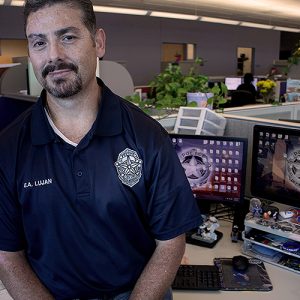 As an experienced police officer, Ed knew the dangers inherent in working the streets of a big city. By day, he was a detective in one of the nation’s largest police departments, investigating financial and property crimes. By night, he occasionally he worked as a security presence at a local club. Then one evening every officer’s worst nightmare unfolded. An altercation with a customer led to an unthinkable act of violence. The enraged patron confronted Ed in the parking lot, ran over him with his car, and dragged him under the chassis, which caused broken bones and brain damage. As a crime fighter, Ed was now the victim, and had fractures and a brain injury as proof.
As an experienced police officer, Ed knew the dangers inherent in working the streets of a big city. By day, he was a detective in one of the nation’s largest police departments, investigating financial and property crimes. By night, he occasionally he worked as a security presence at a local club. Then one evening every officer’s worst nightmare unfolded. An altercation with a customer led to an unthinkable act of violence. The enraged patron confronted Ed in the parking lot, ran over him with his car, and dragged him under the chassis, which caused broken bones and brain damage. As a crime fighter, Ed was now the victim, and had fractures and a brain injury as proof.
He was admitted into the CNS inpatient program with memory deficits, cognitive challenges, attention and processing problems and had low reading and math skill levels. CNS’ multidisciplinary team devised a goal-oriented plan for Ed immediately. They addressed memory deficits by teaching him how to use a date book to remember appointments. He used his phone alarm as a reminder tool. His cognition started at a 1A level and progressed to a 6B level. Ed’s reading comprehension was low at admission, but it quickly jumped to above average, signifying that he would be able to return to work.
In just six months, Ed returned to the police department, continuing his work as a detective in the Property Crimes Division. He was recently approved for full time duty. As with all CNS patients, Ed’s success was the result of meeting goals set by his team. He met all those objectives, including relearning money management, how to initiate and complete chores, and addressing his injuries with physical therapy tailored to his needs. “He did great at CNS,” said his case manager. “Ed was always eager to do therapy, he really got into the rhythm of treatment.”
Ed did more than that. He inspired other CNS patients to achieve independence as he was overcoming his own struggles. “I’d hear him in the hallway,” the case manager remembered, “saying ‘Hey man, you’re doing great.’ Ed helped them process their experience by creating a social bond.”
The job means so much to this 20-year police veteran, and his return to the force has given him a new perspective on something we all reflect on when Labor Day is observed – the ability to work. Ed’s lieutenant is a 25-year veteran of the police department and has witnessed on the job injuries his entire career. “It is more than remarkable that Ed has returned to work so soon,” he said.
CNS Monthly Newsletter
The latest CNS updates, including events, company information, and patient care developments
The Inside View
Quarterly magazine focused on brain injury research, rehabilitation, and advancements shaping the field
Sign-up for one or both to stay connected with brain injury news and recover